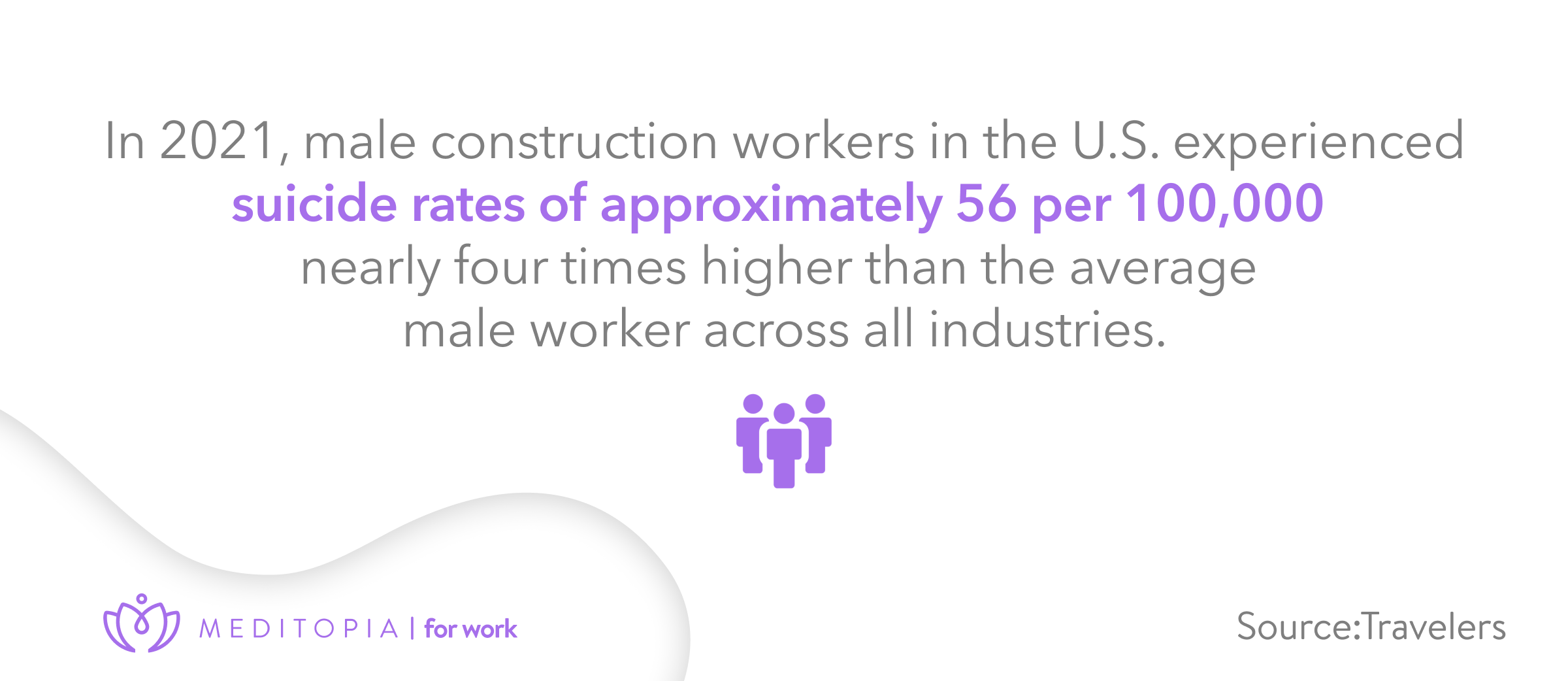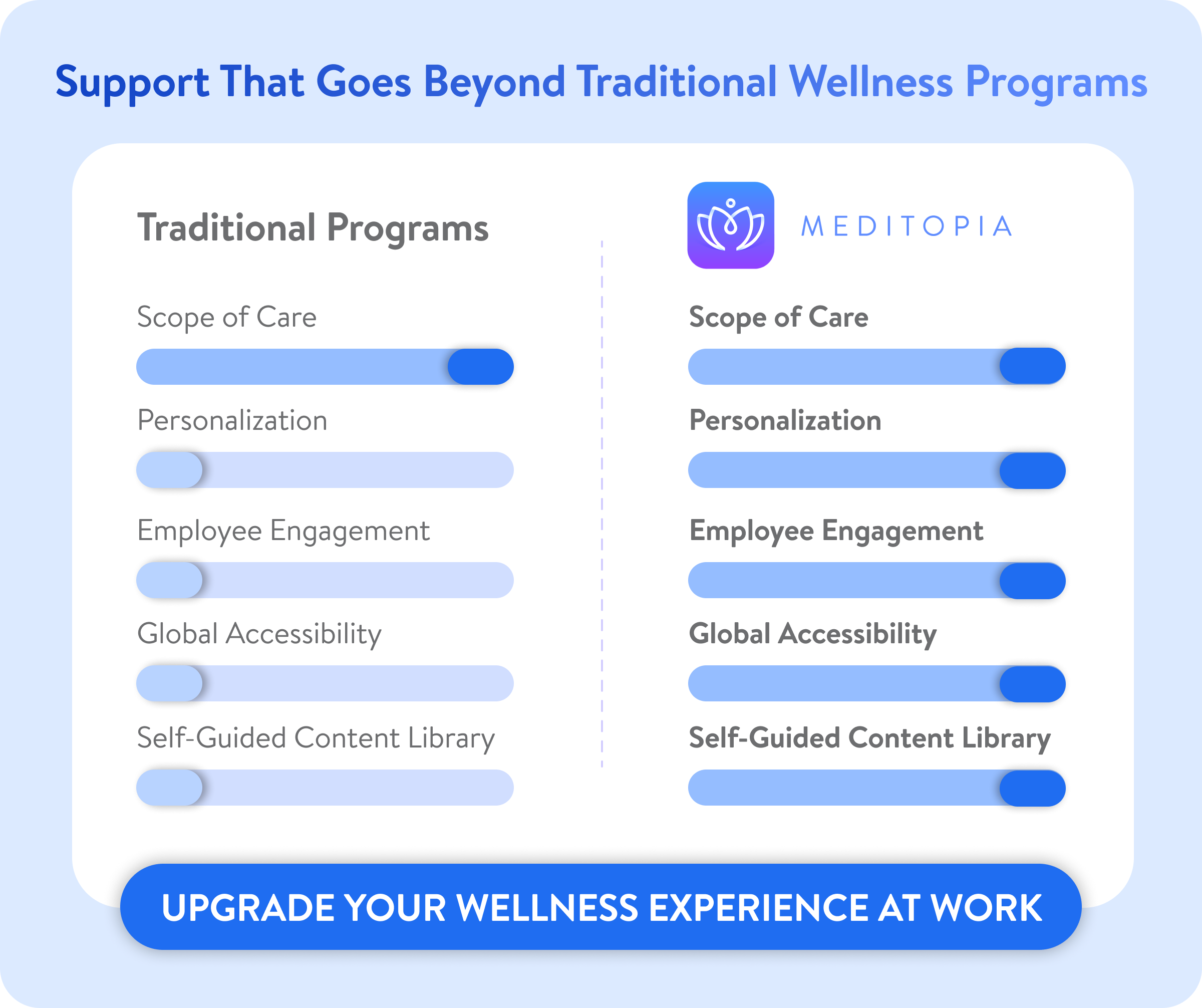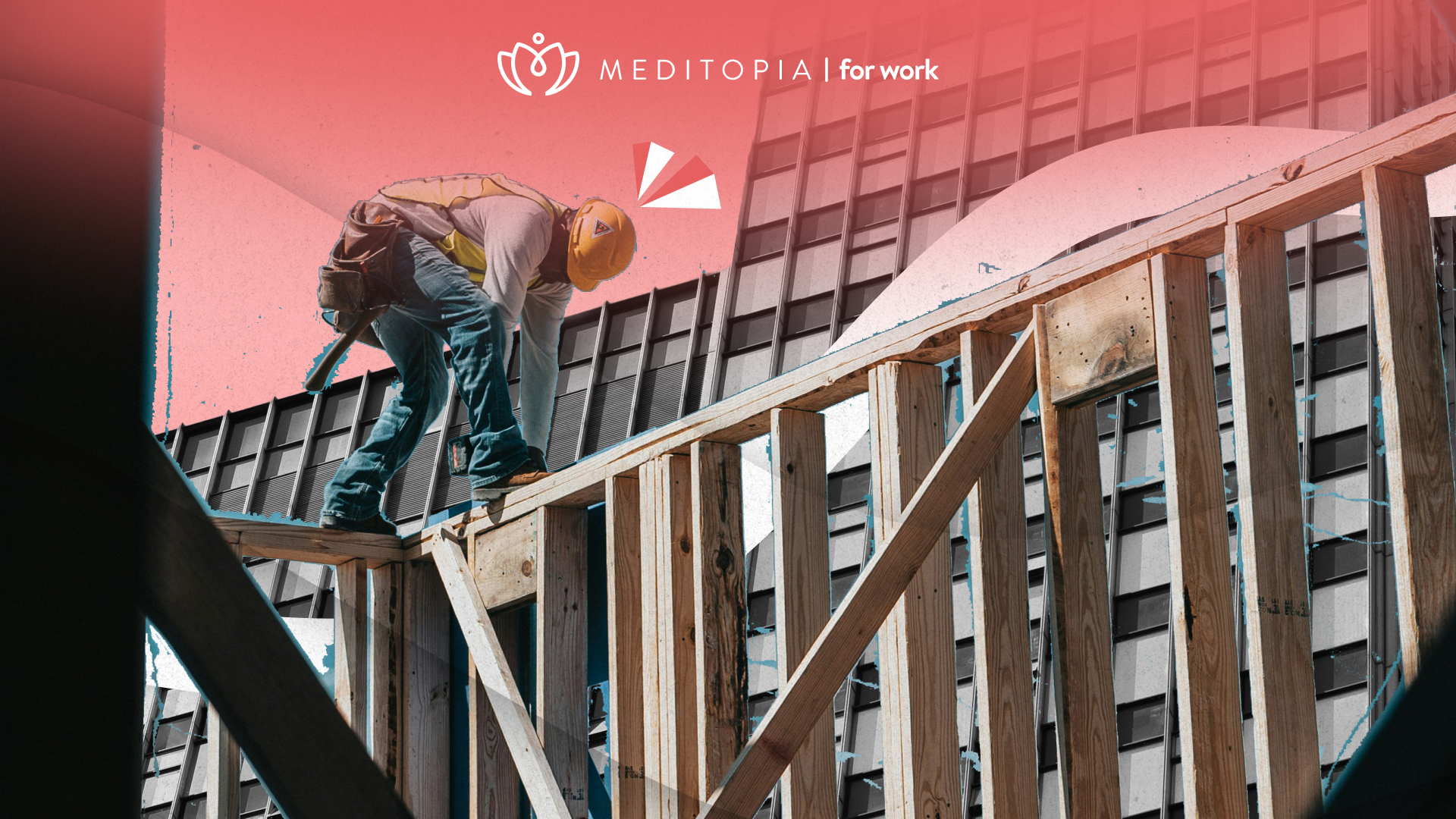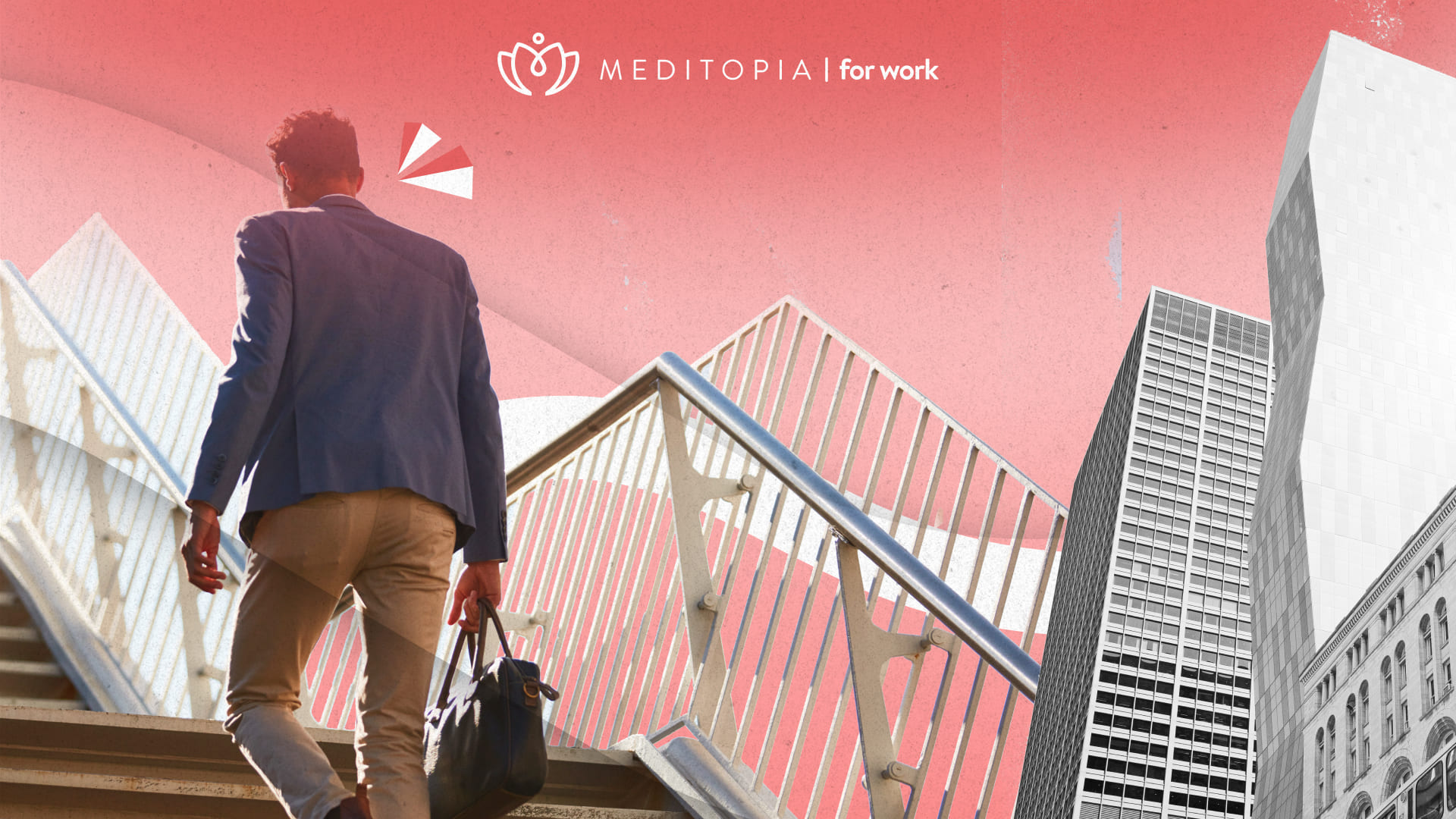The construction industry is one of the most physically and mentally demanding fields today. In fact, construction workers have one of the highest suicide rates among all industries, four times higher than the national average [1]. This stark reality highlights the urgent need for integrated wellness programs that support not just physical safety, but emotional and psychological health as well. Keep reading to discover more stats and benefits of wellness programs in this industry.
Why Wellness Matters: Construction Sector Benchmarks
The construction workforce faces a unique set of challenges that make wellbeing programs not only beneficial but critical. Among the key stressors:
- Physical strain from repetitive, high-impact labor and extended hours on-site.
- In 2021, male construction workers in the U.S. experienced suicide rates of approximately 56 per 100,000, nearly four times higher than the average male worker across all industries (≈ 32 per 100,000) [2].
- Safety-related stress, particularly in roles involving hazardous materials, heavy machinery, or high elevations.
- Inconsistent work hours, leading to poor sleep hygiene and elevated fatigue.
- Mental exhaustion from job insecurity, seasonal layoffs, and constant project changes.
- Studies report that 16–50% of construction workers experience substantial psychological distress [3], with many showing moderate-to-severe levels of anxiety and depression.
- Cultural stigma, especially among male-dominated crews, which discourages seeking help for stress or emotional issues.
- In fact, up to 61% of workers believe stigma prevents them from seeking help, and only about 15% of firms offer dedicated mental health programs [4].
- High rates of substance misuse, often used as a coping mechanism for unmanaged stress or pain.
- Limited access to support, as most workers are mobile or field-based, with little time or tech access to engage in wellness programs.
Common Mental Health & Wellness Challenges in Construction
In construction, daily work involves more than physical strain, it comes with a heavy psychological burden. HR leaders must understand these specific mental health challenges to deploy effective strategies that go beyond compliance and safety gear:
- Chronic fatigue from long, physically demanding shifts and commuting to remote job sites.
- High accident risk, where mental distractions or exhaustion can lead to critical injuries.
- Emotional stress due to inconsistent employment and tight project timelines.
- Low program participation, especially among field workers with no desk access or structured breaks.
- Stigma, especially among male-dominated teams, where seeking mental health support is often seen as weakness.
- Isolation, particularly in small or rotating crews that lack long-term team bonds.
- Limited digital access, making traditional wellness platforms difficult to use in the field.
To address these issues, HR leaders in construction are turning to wellness in infrastructure initiatives that are practical, mobile-first, and designed to match the unique rhythm of site-based work.
Drawing from wellness challenge templates manufacturing workers already use, construction teams can adapt short, high-impact activities that fit into daily routines—even on the job.

What an Effective Wellness Program Looks Like in Construction
Traditional approaches often miss the mark for workers who are on scaffolds, in trenches, or navigating remote sites. That's why wellness programs for construction companies must be built to match the work environment and lifestyle of this workforce.
Key features of successful construction wellness programs include:
- 24/7 accessibility: With early start times and overtime shifts common, workers need round-the-clock access to wellness tools that fit into their unpredictable schedules.
- Offline and mobile-first functionality: Given limited desktop access, especially on-site, wellness solutions must operate seamlessly on mobile devices, even without constant internet like Meditopia offers.
- Anonymous engagement: To overcome stigma, programs must prioritize confidentiality so workers feel safe using mental health support resources.
- Culturally relevant and multilingual content: Many construction sites employ diverse teams; wellness content must reflect this by offering language options and culturally respectful resources.
- Peer-led initiatives and challenges: Group participation can help build trust and normalize the use of wellness tools, especially among skeptical workers.
- Short, high-impact sessions: Programs should include breathing exercises, micro-breaks, and physical recovery routines that can be completed in just a few minutes.
- Emergency response and trauma support: Access to crisis lines, grief counseling, and emotional support services is essential for workers exposed to on-site accidents or fatalities.
Essentially, when wellness programs for construction companies include these features, they don’t just improve morale, they help prevent injuries, reduce absenteeism, and create a healthier, more engaged workforce across the entire project lifecycle.
Example Wellness Program Benefits for Construction
By aligning programs with the demands of high-stress roles, HR leaders can generate real, measurable value from wellness resources for construction employees across multiple operational areas. Here are key benefits of implementing industry-specific wellness programs for construction teams:
- Improved focus and safety: When workers are less fatigued and mentally supported, on-site accident rates decrease and response times improve.
- Reduced absenteeism: Addressing both physical strain and emotional stress results in fewer sick days and unplanned absences.
- Increased morale and retention: Employees who feel valued and supported are more likely to stay, especially in a field known for high turnover.
- Better adaptability under pressure: Wellness practices strengthen emotional resilience—crucial in projects with tight timelines or shifting demands.
- Cultural shift toward openness: Programs that reduce stigma promote conversations around wellbeing, especially important in male-dominated teams.
- Alignment with operational goals: By integrating wellness tools directly into daily routines—such as during breaks or post-shift wind-downs—organizations can keep productivity high without sacrificing health.
For HR leaders overseeing wellness in infrastructure projects, these outcomes make a compelling case for prioritizing human capital alongside project deliverables. Long-term, the ROI of investing in employee wellbeing becomes clear in both cost savings and performance outcomes.
How Leading Construction Companies Approach Wellness
Now that you know more about the mental health challenges in the construction industry, and what wellness programs can do to improve it, it's time to check what other companies are doing and how it has impacted them.
Skanska
Skanska, one of the world’s largest contractor and development firms, integrates mental health into its safety culture through the Be Well – Work Well program. It emphasizes early intervention and breaking stigma across its global operations .
Key points of the program
- Training thousands of employees in mental health awareness.
- Peer-to-peer support model and “Mental Health First Aiders” on worksites.
- Embedding wellness into Safety Week and site inductions.
Results
- Recognized by the UK Health & Safety Executive and Mind Forward Alliance for embedding wellbeing into safety practices.
- Internal reports highlight increased conversations about mental health and uptake of resources (culture shift indicator) [5].
Balfour Beatty
Balfour Beatty uses a “Health by Design” strategy, embedding psychosocial health alongside physical safety to improve overall wellbeing in its workforce.
Key points of the program
- It co-founded the Health in Construction Leadership Group (HCLG) and supports Mates in Mind, a UK initiative tackling mental health stigma.
- The company delivers mental health training to thousands, having trained nearly 600 Mental Health First Aiders across the UK, and encourages Manage the Conversation modules for managers.
- It also launched a Make It Visible campaign to bring mental health support directly onto construction sites via posters and mobile support vehicles
Results
- The program earned recognition as “Best Mental Wellbeing in the Workplace Strategy.”
- Internal metrics show 78% engagement, with 97% feeling cared for and 91% comfortable discussing wellbeing at work [6].
VINCI
VINCI, one of the world’s largest construction and infrastructure groups, operates across Europe, Asia, Africa, and the Middle East, employing more than 280,000 people globally. Given the scale and diversity of its workforce, VINCI approaches mental health as a core pillar of occupational safety and long-term performance.
Key Points of the Program
- Integrates mental health into its global Health & Safety culture
- Implements early detection and prevention programs focused on psychosocial risks such as fatigue, job insecurity, and high-pressure project timelines.
- Provides manager training to help site leaders identify warning signs of psychological distress and respond appropriately.
Results
- Improved safety culture maturity, with increased openness around discussing mental health on worksites.
- Stronger engagement with wellbeing resources and better alignment between mental health prevention and accident reduction strategies.
- The company’s integrated approach is frequently cited in European occupational health discussions as a best practice for large, decentralized construction workforces [7].
The Future of Wellness in Construction
The construction industry is moving toward tech-enabled, stigma-free wellness that meets workers where they are, often on scaffolds, in trenches, or at remote sites.
- AI-driven personalization: AI companions can deliver real-time emotional support, identify stress patterns in shift data, and provide micro-recommendations tailored to physically demanding roles.
- For industries like construction, AI helps overcome stigma by offering confidential, judgment-free access.
- Wearables for safety and fatigue detection: Wearables track heart rate variability, fatigue, and hydration, critical markers in preventing accidents.
- Also, wearable fatigue monitors helped reduce fatigue-related safety incidents by up to 20% in pilot construction programs [8].
- Mobile-first, offline-ready apps: As most workers lack consistent desktop access, mobile-first wellness solutions (with offline functionality) enable micro-breaks, stress relief, and crisis access directly on-site.
- Research in the Journal of Medical Internet Research found that mobile interventions improved stress and sleep outcomes among shift-based workers [9] .
In an industry where suicide and accident rates remain among the highest, leveraging AI, wearables, and mobile-first wellness platforms like Meditopia will be key to building safer, healthier, and more sustainable project environments.
Meditopia for Work: Wellness That Fits the Construction Industry
Meditopia for Work is purpose-built to meet the needs of physically active, field-based teams like those in the construction industry. It offers a scalable ecosystem of wellness tools that match the demands of ever-changing job sites, rotating crews, and the high-pressure nature of infrastructure development.

- Mobile-first and offline-ready, Meditopia is an EAP that offers access to exclusive wellness tools during breaks, at home, or even on remote job sites.
- Targeted webinars and workshops focus on key challenges in construction, such as injury-related stress, crisis support, communication across diverse crews, and fatigue recovery.
- Confidential mental health support including therapy, meditation, and coaching, is offered in 14 languages and structured to reduce stigma in male-dominated workforces.
- Soul, Meditopia’s AI mental health companion, delivers real-time emotional support, ideal for isolated workers or those facing on-the-job stress.
- Proven results: Construction workers using Meditopia report a 27% reduction in stress and a 21% boost in positive emotions after just eight weeks of regular use.
- Short-form content fits easily into a foreman’s break or a laborer’s wind-down period, with breathing exercises and micro-sessions focused on recovery and resilience.
- 24/7 access ensures coverage for all shifts.
- Anonymous use and automated onboarding break down barriers.
- A wide-ranging expert network is available, including therapists, personal trainers, nutritionists, legal advisors, and even veterinarians.
With Meditopia for Work, construction wellness programs become more than an HR checkbox, they become a trusted part of the work culture, reducing injuries, increasing morale, and promoting long-term retention.
Explore Employee Wellness Programs Across Industries
Wellness at work looks different depending on the field, especially regarding a high-stress industry like construction. Explore how industries address their specific challenges and what’s unfolding in today’s wellness landscape.

























